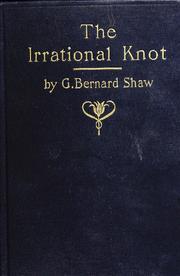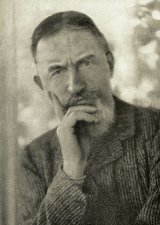The Irrational Knot Page #6
The Irrational Knot was first published in 1905, having been written in 1880. Within a framework of leisure class preoccupations and frivolities Shaw disdains hereditary status and proclaims the nobility of workers. Marriage, as the knot in question, is exemplified by the union of Marian Lind, a lady of the upper class, to Edward Conolly, always a workman but now a magnate, thanks to his invention of an electric motor that makes steam engines obsolete. The marriage soon deteriorates, primarily because Marian fails to rise above the preconceptions and limitations of her social class and is, therefore, unable to share her husband's interests.
A shifting, rustling sound, as of somebody dressing, which had been audible for some minutes through the folding doors, now ceased, and a handsome young woman entered. She had thick black hair, fine dark eyes, an oval face, a clear olive complexion, and an elastic figure. She was incompletely attired in a petticoat that did not hide her ankles, and stays of bright red silk with white laces and seams. Quite unconcerned at the presence of the man, she poured out a cup of tea; carried it to the mantelpiece; and began to arrange her hair before the glass. He, without looking round, completed the arrangement of his tie, looked at it earnestly for a moment, and said, "Have you got a pin about you?" "There is one in the pincushion on my table," she said; "but I think it's a black one. I dont know where the deuce all the pins go to." Then, casting off the subject, she whistled a long and florid cadenza, and added, by way of instrumental interlude, a remarkably close imitation of a violoncello. Meanwhile the man went into her room for the pin. On his return she suddenly became curious, and said, "Where are you going to-night, if one may ask?" "I am going out." She looked at him for a moment, and turned contemptuously to the mirror, saying, "Thank you. Sorry to be inquisitive." "I am going to sing for the Countess of Carbury at a concert at Wandsworth." "Sing! You! The Countess of Barbury! Does she live at Wandsworth?" "No. She lives in Park Lane." "Oh! I beg her pardon." The man made no comment on this; and she, after looking doubtfully at him to assure herself that he was in earnest, continued, "How does the Countess of Whatshername come to know you, pray?" "Why not?" A long pause ensued. Then she said: "Stuff!", but without conviction. Her exclamation had no apparent effect on him until he had buttoned his waistcoat and arranged his watch-chain. Then he glanced at a sheet of pink paper which lay on the mantelpiece. She snatched it at once; opened it; stared incredulously at it; and said, "Pink paper, and scalloped edges! How filthily vulgar! I thought she was not much of a Countess! Ahem! 'Music for the People. Parnassus Society. A concert will be given at the Town Hall, Wandsworth, on Tuesday, the 25th April, by the Countess of Carbury, assisted by the following ladies and gentlemen. Miss Elinor McQuinch'--what a name! 'Miss Marian Lind'--who's Miss Marian Lind?" "How should I know?" "I only thought, as she is a pal of the Countess, that you would most likely be intimate with her. 'Mrs. Leith Fairfax.' There is a Mrs. Leith Fairfax who writes novels, and very rotten novels they are, too. Who are the gentlemen? 'Mr. Marmaduke Lind'--brother to Miss Marian, I suppose. 'Mr. Edward Conolly'--save the mark! they must have been rather hard up for gentlemen when they put you down as one. The Conolly family is looking up at last. Hm! nearly a dozen altogether. 'Tickets will be distributed to the families of working men by the Rev. George Lind'--pity they didnt engage Jenny Lind on purpose to sing with you. 'A limited number of front seats at one shilling. Please turn over. Part I. Symphony in F: Haydn. Arranged for four English concertinas by Julius Baker. Mr. Julius Baker; Master Julius Abt Baker; Miss Lisette Baker (aged 8); and Miss Totty Baker (aged 6-1/2)'. Good Lord! 'Song: Rose softly blooming: Spohr. Miss Marian Lind.' I wonder whether she can sing! 'Polonaise in A flat major: Chopin'--what rot! As if working people cared about Chopin! Miss Elinor McQuinch is a fool, I see. 'Song: The Valley: Gounod.' Of course: I knew you would try that. Oho! Here's something sensible at last. 'N*gger melody. Uncle Ned. Mr. Marmaduke Lind, accompanied by himself on the banjo.' Dum, drum. Dum, drum. Dum, drum. Dum-- 'And there was an ole nigga; and his name was Uncle Ned; An' him dead long ago, long ago. An' he had no hair on the top of his head In the place where the wool ought to grow,' Mr. Marmaduke Lind will get a double encore; and no one will take the least notice of you or the others. 'Recitation. The Faithful Soul. Adelaide Proctor. Mrs. Leith Fairfax.' Well, this certainly is a blessed attempt to amuse Wandsworth. Another reading by the Rev.----" Here Conolly, who had been putting on his overcoat, picked the program deftly from his sister's fingers, and left the room. She, after damning him very heartily, returned to the glass, and continued dressing, taking her tea at intervals until she was ready to go out, when she sent for a cab, and bade the driver convey her to the Bijou Theatre, Soho. Conolly, on arriving at the Wandsworth Town Hall, was directed to a committee room, which served as green-room on this occasion. He was greeted by a clean shaven young clergyman who protested that he was glad to see him there, but did not offer his hand. Conolly thanked him briefly, and went without further ceremony to the table, and was about to place his hat and overcoat on a heap of similar garments, when, observing that there were some hooks along the wall, he immediately crossed over and hung up his things on them, thereby producing an underbred effect of being more prudent and observant than the rest. Then he looked at his program, and calculated how soon his turn to sing would come. Then he unrolled his music, and placed two copies of Le Vallon ready to his hand upon the table. Having made these arrangements with a self-possession that quite disconcerted the clergyman, he turned to examine the rest of the company. His first glance was arrested by the beauty of a young lady with light brown hair and gentle grey eyes, who sat near the fire. Beside her, on a lower chair, was a small, lean, and very restless young woman with keen dark eyes staring defiantly from a worn face. These two were attended by a jovial young gentleman with curly auburn hair, who was twanging a banjo, and occasionally provoking an exclamation of annoyance from the restless girl by requesting her opinion of his progress in tuning the instrument. Near them stood a tall man, dark and handsome. He seemed unused to his present circumstances, and contemptuous, not of the company nor the object for which they were assembled, but in the abstract, as if habitual contempt were part of his nature. The clergyman, who had just conducted to the platform an elderly professor in a shabby frock coat, followed by three well-washed children, each of whom carried a concertina, now returned and sat down beside a middle-aged lady, who made herself conspicuous by using a gold framed eyeglass so as to convey an impression that she was an exceedingly keen observer. "It is fortunate that the evening is so fine," said the clergyman to her. "Yes, is it not, Mr. Lind?" "My throat is always affected by bad weather, Mrs. Leith Fairfax. I shall be so handicapped by the inevitable comparison of my elocution with yours, that I am glad the weather is favorable to me, though the comparison is not."
Translation
Translate and read this book in other languages:
Select another language:
- - Select -
- 简体中文 (Chinese - Simplified)
- 繁體中文 (Chinese - Traditional)
- Español (Spanish)
- Esperanto (Esperanto)
- 日本語 (Japanese)
- Português (Portuguese)
- Deutsch (German)
- العربية (Arabic)
- Français (French)
- Русский (Russian)
- ಕನ್ನಡ (Kannada)
- 한국어 (Korean)
- עברית (Hebrew)
- Gaeilge (Irish)
- Українська (Ukrainian)
- اردو (Urdu)
- Magyar (Hungarian)
- मानक हिन्दी (Hindi)
- Indonesia (Indonesian)
- Italiano (Italian)
- தமிழ் (Tamil)
- Türkçe (Turkish)
- తెలుగు (Telugu)
- ภาษาไทย (Thai)
- Tiếng Việt (Vietnamese)
- Čeština (Czech)
- Polski (Polish)
- Bahasa Indonesia (Indonesian)
- Românește (Romanian)
- Nederlands (Dutch)
- Ελληνικά (Greek)
- Latinum (Latin)
- Svenska (Swedish)
- Dansk (Danish)
- Suomi (Finnish)
- فارسی (Persian)
- ייִדיש (Yiddish)
- հայերեն (Armenian)
- Norsk (Norwegian)
- English (English)
Citation
Use the citation below to add this book to your bibliography:
Style:MLAChicagoAPA
"The Irrational Knot Books." Literature.com. STANDS4 LLC, 2024. Web. 22 Dec. 2024. <https://www.literature.com/book/the_irrational_knot_7>.




Discuss this The Irrational Knot book with the community:
Report Comment
We're doing our best to make sure our content is useful, accurate and safe.
If by any chance you spot an inappropriate comment while navigating through our website please use this form to let us know, and we'll take care of it shortly.
Attachment
You need to be logged in to favorite.
Log In